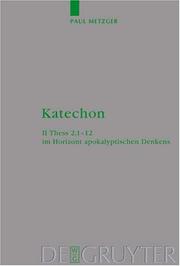| Listing 1 - 2 of 2 |
Sort by
|

ISBN: 3110184605 3110911108 9783110184600 Year: 2012 Volume: 135 Publisher: Berlin ; Boston : De Gruyter,
Abstract | Keywords | Export | Availability | Bookmark
 Loading...
Loading...Choose an application
- Reference Manager
- EndNote
- RefWorks (Direct export to RefWorks)
Vor dem Hintergrund antiker Texte untersucht die Arbeit, was oder wer im 2. Thess unter dem die Wiederkehr Christi verhindernden "Katechon" zu verstehen ist.
Second Advent --- Katechon (The Greek word) --- History of doctrines --- Biblical teaching --- 227.1*7 --- Brieven van Paulus aan de Thessalonicenzen --- 227.1*7 Brieven van Paulus aan de Thessalonicenzen --- Parousia --- Second Coming of Christ --- Eschatology --- Judgment Day --- Millennium (Eschatology) --- Bible. --- Criticism, interpretation, etc. --- Biblical teaching. --- Second Advent - History of doctrines - Early church, ca. 30-600 --- Second Advent - Biblical teaching

ISBN: 3110175959 3110892480 9783110175950 Year: 2012 Volume: 116 Publisher: Berlin ; Boston : De Gruyter,
Abstract | Keywords | Export | Availability | Bookmark
 Loading...
Loading...Choose an application
- Reference Manager
- EndNote
- RefWorks (Direct export to RefWorks)
Der Band untersucht die fünf Stellen des Hebräerbriefes, die herkömmlicherweise als Hinweise auf die Parusie Christi gedeutet werden (Hebr 1,6; 9,28; 10,25.36-39; 12,25-29). Ausgangspunkt ist die Feststellung, dass eine apokalyptische Rede von der Parusie zur übrigen Denkweise des Schreibens nicht recht passen will, die eher von einer mittelplatonischen Ontologie geprägt ist. Zur Auflösung dieser Spannung werden in Teil I die problematischen Stellen des Hebräerbriefes textimmanent analysiert und in Teil II mit relevanten Texten von Philon, Plutarch, Seneca und Alkinoos in Verbindung gebracht, die ebenfalls eingehend analysiert werden. Teil III führt schließlich die Ergebnisse der ersten beiden Teile zusammen und macht eine mittelplatonische Umformung des Parusiegedankens durch den Autor des Hebräerbriefes plausibel. This study examines the five passages in the Epistle to the Hebrews which are traditionally regarded as references to Christ's Second Coming (Hebr 1,6; 9,28; 10,25.36-39; 12,25-29). The starting point is the contention that apocalyptic references to the parousia do not match the thinking of the rest of the epistle, which is determined rather by a Middle Platonic ontology. In order to resolve this tension, Part I undertakes a close textual analysis of the problematical passages in the Letter to the Hebrews, and in Part II these are related to relevant texts by Philon, Plutarch, Seneca and Alcinous, which are also subjected to close analysis. Part III finally synthesises the results of the first two parts and shows that it is plausible to accept that the author of the Letter to the Hebrews has undertaken a Middle Platonic transformation of the notion of the Second Coming.
Second Advent --- Parousia (Philosophy) --- Neoplatonism --- Platonists --- Cosmology, Ancient --- Philosophy and religion --- Biblical teaching --- 227.1*9 --- 141.131 --- Brief van Paulus aan de Hebreeën --- Platonisme. Neoplatonisme --- 141.131 Platonisme. Neoplatonisme --- 227.1*9 Brief van Paulus aan de Hebreeën --- Platonism --- Philosophers --- Philosophy, Ancient --- Christianity and philosophy --- Religion and philosophy --- Religion --- Mind and body --- Soul --- Alexandrian school --- Church history --- Hellenism --- Philosophy --- Theosophy --- Ancient cosmology --- Bible. --- Epistle to the Hebrews --- Hebräerbrief (Book of the New Testament) --- Hebrews (Book of the New Testament) --- Poslanie do Evreite (Book of the New Testament) --- Risālah ilá al-ʻIbrānīyīn (Book of the New Testament) --- Criticism, interpretation, etc. --- Neoplatonism. --- Platonists. --- Cosmology, Ancient. --- Philosophy and religion. --- Biblical teaching. --- Second Advent - Biblical teaching
| Listing 1 - 2 of 2 |
Sort by
|

 Search
Search Feedback
Feedback About
About Help
Help News
News